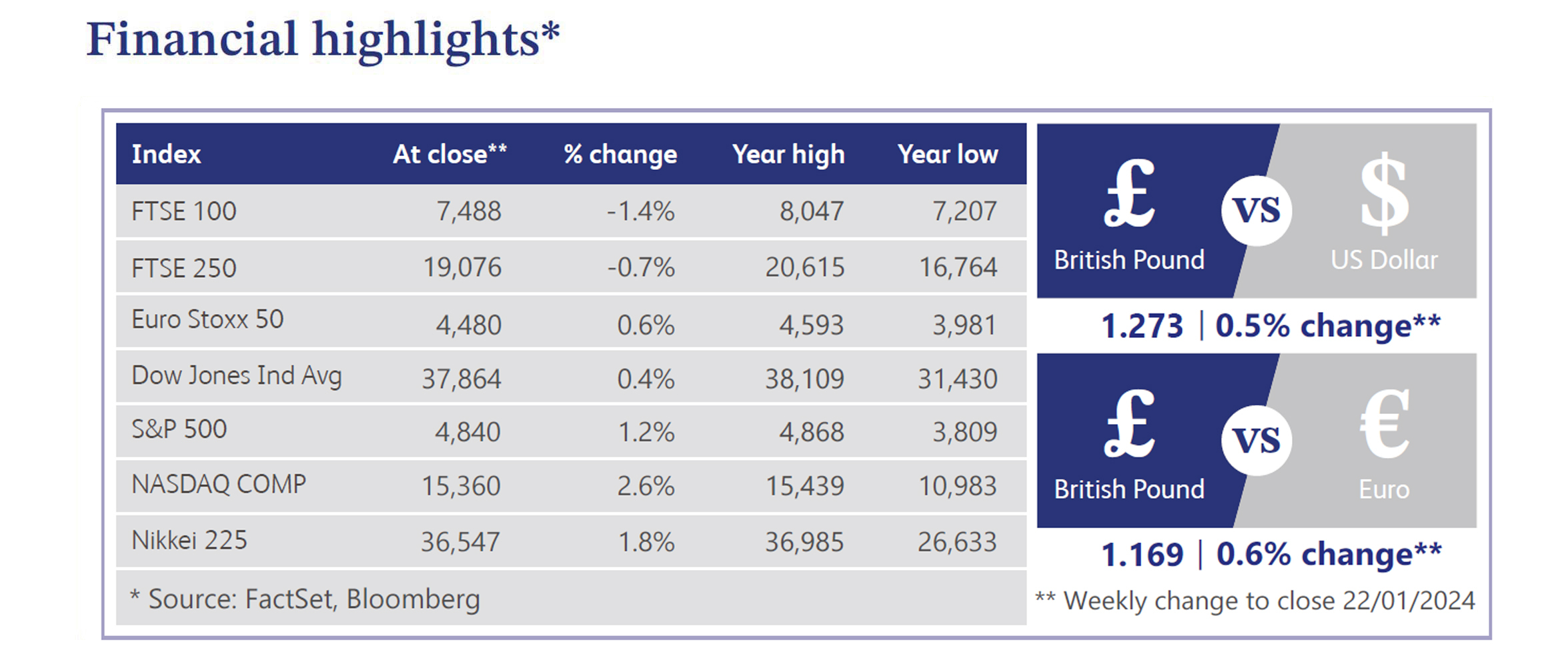
23 January 2024
Market News
Last week, UK inflation figures surprised on the upside, with the headline Consumer Price Index showing 4%, surpassing the consensus estimate of 3.8%. Core inflation also exceeded expectations at 5.1%, deviating from the forecasted 4.9%. Despite the increase, economists caution against overinterpreting this data, as inflation is projected to reach the Bank of England's (“BOE”) 2% target by the spring. Nevertheless, this data counters market complacency, suggesting the BOE might delay the pivot towards interest rate cuts until later in the year. The market is now largely pricing in the first interest rate cut in May, with the expectation of overall rate cuts in 2024 decreasing from 1.25% to 1.10%.
Signs of easing in the UK labour market emerged as the claimant count in December increased by 11,700 to 1.57 million, below the consensus estimate of an increase of 18,100. Job vacancies fell for the 17th consecutive period, dropping 45,000 on the quarter to 949,000. Average weekly earnings also showed signs of cooling, standing at 6.5%, compared to the consensus of 6.8%. The surprising inflation data prompted a reduction in BOE rate cut bets, with the market largely pricing in the first rate cut in May, and overall rate cuts in 2024 decreasing from 1.25% to 1.10%.
Kevin Ellis, Chairman to one of the UK’s 'Big Four’ accountancy firms, PwC, challenged predictions of zero growth for the UK economy. Ellis cited a survey conducted by the firm that showed business leaders expressed more optimism than the BOE's forecasts. The survey showed Chief Executive Officers (“CEOs”) in the UK demonstrated the most optimism about growth among G7 nations. Over half of the surveyed CEOs plan at least one acquisition in 2024, and almost half intend to expand their workforce by at least 5%. It also suggested that concerns over inflation have been reduced, with less than a quarter of firms reporting that their firm is highly exposed. However, warning signs remain. Bloomberg reported UK insolvencies jumped 14% in 2023, reaching 25,159, driven by higher borrowing costs and weaker economic growth particularly in retail, construction, and hospitality.
The London initial public offering market is showing signs of revival, but a KPMG survey suggests a full recovery is not expected until 2025. UK and international firms remain cautious about listing in the UK due to concerns regarding a small buyer base, a valuation gap and poor shareholder returns from recent listings.
The UK housing market is experiencing a positive shift, with the latest Rightmove survey showing the strongest start to a year since 2020. Average asking prices increased by 1.3% between December and January. Mortgage rate cuts by banks vying for market share contributed to this positive trend. Analysts anticipate modest price increases instead of further falls. However, Office for National Statistics data, though slightly behind updates from mortgage lenders, showed UK house prices falling at the fastest pace in more than a decade in November, with a 2.1% decrease. Analysts are catching up with this shift, with firms like Morgan Stanley dropping a previous call for a sharp contraction and now anticipating a 3% rise in prices this year.

Ocado, the grocery technology business, saw its share price decline by approximately 15.4% last week after the company announced its latest quarterly results. The company announced revenue of £609 million for the final quarter of 2023, an increase of 10.9% in comparison to last year's figure of £549 million. This also contributed to its full year revenue figure of £2.4 billion, a 7% increase from last year. Despite the demonstrated revenue growth, the market appeared disappointed with the results, largely because of the company’s conservative commentary around its full year 2024 earnings before interest, tax, depreciation and amortisation.
Dunelm Group, the homewares retailer, announced half-year results last week, which saw the company’s share price close the week approximately 3.6% lower. The company reported revenue of £873 million for the first half of the year, an increase of 4.5% in comparison to last year's figure of £835 million. However, the company announced the new economic environment has resulted in a challenging market which appeared to be a dampener on market expectations.
Flutter Entertainment, the global betting and gaming company, saw its share price surge by approximately 22.7% last week after announcing its final quarter results for 2023. The company reported full year revenues of £9.5 billion, an increase of 24% in comparison to last year's figure of £7.7 billion. It appears that analysts are expecting positive momentum to continue in response to its US listing, which is still on track to be completed at the end of the month.

Market Commentary prepared by Walker Crips Investment Management Limited.
This publication is intended to be Walker Crips Investment Management’s own commentary on markets. It is not investment research and should not be construed as an offer or solicitation to buy, sell or trade in any of the investments, sectors or asset classes mentioned. The value of any investment and the income arising from it is not guaranteed and can fall as well as rise, so that you may not get back the amount you originally invested. Past performance is not a reliable indicator of future results. Movements in exchange rates can have an adverse effect on the value, price or income of any non-sterling denominated investment. Nothing in this document constitutes advice to undertake a transaction, and if you require professional advice you should contact your financial adviser or your usual contact at Walker Crips. Walker Crips Investment Management Limited is authorised and regulated by the Financial Conduct Authority and is a member of the London Stock Exchange. Registered office: Old Change House, 128 Queen Victoria Street, London, EC4V 4BJ. Registered in England and Wales number 4774117.
Important Note
No news or research content is a recommendation to deal. It is important to remember that the value of investments and the income from them can go down as well as up, so you could get back less than you invest. If you have any doubts about the suitability of any investment for your circumstances, you should contact your financial advisor.